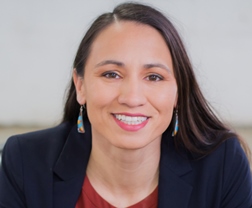Davids challenges Adkins’ position on abortion, link to Brownback
by Tim Carpenter, Kansas Reflector
Shawnee — Republican congressional candidate Amanda Adkins argued staff increases at the Internal Revenue Service would trigger more audits of middle- and low-income Kansans rather than target extremely wealthy individuals or companies suspected of cheating on federal taxes.
Adkins, who is challenging Democratic U.S. Rep. Sharice Davids in the 3rd District, said during a news conference Monday potential voters attending her campaign events were rattled by allocation of $80 billion over the next decade to improve IRS customer service, upgrade computer systems and bolster enforcement.
“They view the action as the IRS is going to be out there to get all of us,” said Adkins, who claimed Kansans’ fears were justified. “The belief system of people in this district … is the federal government is coming after me. I’ve heard it over and over.”
U.S. Treasury Secretary Jane Yellen directed new funding to the IRS be used to raise audit rates for Americans making more than $400,000 per year, Bloomberg Tax reported. In addition, the treasury department said new IRS employees hired under the expansion program would concentrate on “high-income and corporate tax evaders.”
Adkins used her event to endorse the “Commitment to America” policy blueprint released by U.S. House Republicans. It outlined how a GOP-led House would approach the economy, public safety, government accountability and other issues.
Under the plan lauded by Adkins, one of the top priorities of GOP House leaders would be repeal of appropriations for more staff at the IRS.
Davids defeated Adkins by 10 percentage points in 2020, but the Legislature gerrymandered the 3rd District to eliminate half of Wyandotte County and add Miami, Franklin and Anderson counties to the district. The redrawn map retained vote-rich Johnson County, which rejected an abortion amendment to the Kansas Constitution 174,900 votes to 79,800 votes in August.
The U.S. House is led by Democrats, who hold 221 seats to Republicans’ 212, with two vacancies. The balance of power could shift in the November election if Democrats lost a handful of seats.
Abortion ‘misread’
In response to a question, Adkins said she was opposed to a federal ban on abortion but would work to support legislation in Kansas or elsewhere to reduce abortion in the United States. The issue took on heightened importance in 2022 elections after the U.S. Supreme Court overturned Roe v. Wade to sever the national constitutional right to abortion.
“Everything changed with the Supreme Court decision to reverse Roe,” said Adkins, who put opposition to abortion at the forefront of her campaigns in 2020 and 2022. “I’ve said the federal government should not focus on a ban.”
In August, Kansas voters defeated by more than 172,000 votes an amendment to the Kansas Constitution that would nullify a Kansas Supreme Court opinion the document gave women the right to bodily autonomy and abortion.
Passage of the amendment could have opened a path to adoption of further state restrictions on the right to abortion, including a prohibition without exceptions for rape or incest.
Adkins expressed doubt abortion policy would be a significant issue in her Nov. 8 showdown with Davids.
“It is a misread on the part of the Democrats to think that this is the issue that is driving people,” Adkins said.
On the record
Ellie Turner, spokeswoman for Davids’ campaign for reelection, said Adkins was on record as endorsing a platform banning abortions without exception in the United States.
“That is wildly out of step with voters in the Kansas 3rd, who came out in record numbers to reject exactly that type of extremism in August — and who will do it again in November,” Turner said.
Davids released a television commercial on broadcast, cable and satellite TV emphasizing Adkins’ “100%” support for the state abortion amendment rejected by three-fifths of Kansas voters. The ad pointed to Adkins’ endorsement of a GOP conservative group’s policy agenda that included bills eliminating abortion rights on a national basis.
The commercial referenced a National Right to Life organization staff member’s view that a 10-year-old rape victim ought to be compelled to give birth. Adkins is endorsed by the organization’s state chapter, Kansans for Life.
Davids’ campaign also pushed back on the attempt by Adkins to distance herself from unpopular former Gov. Sam Brownback, who was governor from 2011 to 2018.
Adkins served as a campaign manager for Brownback, led the Kansas Republican Party and was appointed by Brownback to lead the Kansas Children’s Cabinet, but Adkins said she never earned a state government paycheck while serving the Brownback administration.
She said Democrats didn’t want to acknowledge her career at Cerner, a health information technology company.
“Amanda Adkins shaped, supported, and celebrated Sam Brownback’s disastrous policies for almost two decades, working at his side even when it meant Kansas kids suffered,” said Turner, Davids’ spokeswoman. “A record like that is not something you can brush off, especially when Kansans are still recovering from the harm Brownback and his allies did to our state.”
GOP objectives
In terms of the House GOP’s “Commitment to America,” Adkins said it was important to build more wall and surveillance towers on the border with Mexico to deter drug smugglers and human trafficking. She said the United States had to expand oil and gas production and renew interest in nuclear power, which she labeled the “cleanest form of energy.”
Kansans are most concerned about price inflation and the need to restrain “reckless” federal spending embraced by President Joe Biden, Adkins said.
In terms of education policy, Adkins said Congress ought to let states determine content of a parental bill of rights that would increase transparency about what and how children were taught.
“There’s no reason why that dialogue can’t happen within a trusted relationship between a parent and a teacher and it should happen,” Adkins said.
Kansas Reflector stories, www.kansasreflector.com, may be republished online or in print under Creative Commons license CC BY-NC-ND 4.0.
See more at https://kansasreflector.com/2022/09/27/adkins-taps-into-anxiety-of-irs-audit-surge-criticizes-democrats-focus-on-abortion/

